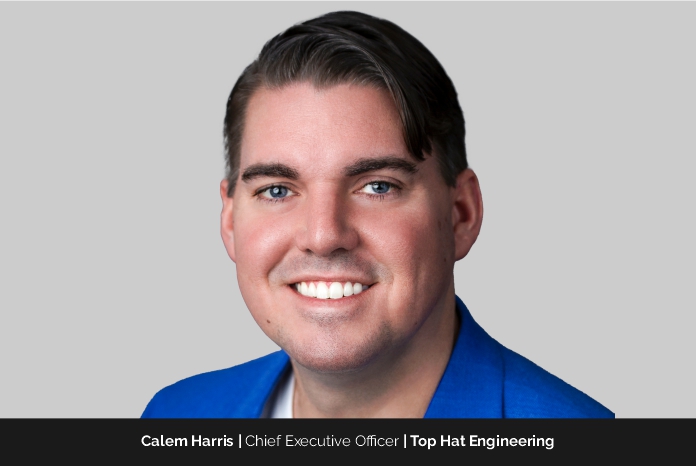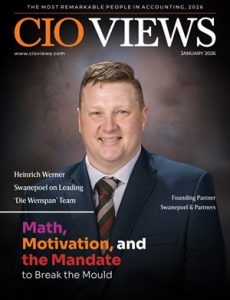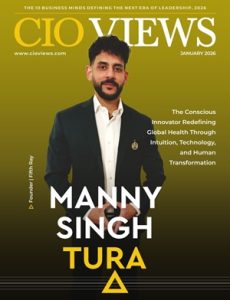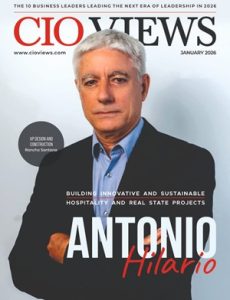Calem Harris, CEO at Top Hat Engineering, is driven by a desire to build products that have a positive impact on people’s lives. Currently, he is not only disrupting warehouse operations through innovative technology, but also uplifting his employees and communities with his servant-leadership approach. A former U.S Marine, Calem has more than ten years of supply chain engineering experience. He is also recognized in the industry for his reputation for never walking away from complex challenges.
“I am very risk tolerant, both personally and professionally,” Calem says. “That comes from having the courage to take a leap of faith, speak up, or take action when it is required, and having the fortitude to stand behind the outcomes even if they are negative.”
Two Major Influences: Father and USNA
Calem credits his father for shaping him into a fantastic leader. He was still in 9th grade when he attended his father’s retirement ceremony, which left an indelible impact on him. Although he had never seen the kind of work his father did, the ceremony offered him a glimpse into his father’s accomplishments. Calem heard stories about how his father took care of his soldiers and the people in their community, as well as about the individuals who had gone through the correctional program he had built from scratch.
He also recalls that his father always reminded him that good leaders lead by example, morally, mentally, and physically. “Even his daily routine taught me how hard I would have to work to be the leader I wanted to be,” he says.
After his father, the United States Naval Academy (USNA) played a pivotal role in Calem’s development as a leader. “The USNA doesn’t just imbue midshipmen with the highest values of duty, honor, and loyalty,” he points out. “It is ingrained in you as a daily habit.” At the naval academy, he was taught to be a servant leader. He learned that when difficult decisions needed to be made, he had to step up to make them; when people were going through tough times, he had to motivate and inspire them to pull through. “And, when there is a grenade thrown, you are the first to jump on it,” says Calem.
As a leader, he believes it is a privilege to see people follow him and his vision. “Consequently, you carry the privilege/burden of ensuring their lives are enriched by their decision to follow you,” according to Calem.
Lessons Learned from Military Experience
Calem led Marines in Central and South America, the Middle East, and on special missions in Africa and Europe. This allowed him to work with exemplary people across the world. They belonged to different cultures, religions, and ethnicities, yet they all were trying to accomplish the same thing: Peace, Security, and Socioeconomic stability. “My experiences taught me that true change can happen,” Calem says, “but it takes patience, hard work, discipline, and collaboration.”
Even today, he often thinks about the experiences he gained while serving in the military, as they helped him understand that true collaboration, teamwork, and meaningful dialogue are needed to achieve a common strategic objective.
Natural Creator: Building Solutions that Provide True Value
A “natural creator,” Calem is passionate about creating a cultural change for the better. He has an innate talent for building products that add value to people’s lives and for developing processes or protocols that streamline operations. “This started when I was very young,” Calem shares. “My mom just reminded me of this the other day.”
He was just seven when he designed a prototype machine that could carry people in wheelchairs up the stairs. Three years later, he saw the same design in an ad for a Stair Lift. “I may not have secured a patent, but I spent weeks on different iterations of the design based on the wheelchairs I saw,” Calem recalls.
Later, when he was studying for a Master’s degree, he designed a software system that could integrate military intelligence and operations for the Special Operations Command (SOCOM). He was also in discussions with Palantir to turn the design into a real product. “That innovative ambition has stayed with me,” Calem says. “I will always continue to build solutions that provide TRUE value.”
Post-Transition: The Career Defining Moment
Since he turned 14, all that Calem had known were military values, work ethic, and a brotherhood that cannot be replaced. So, he found it difficult to transition to civilian life from the Marine Corps. Calem considers his move to civilian life a defining moment of his career.
According to him, he spent almost a year learning about his “new” self, who no longer donned the uniform. To adapt to civilian life, he read two to three books every week, including titles on self-help and business finance. He was very active in his community, so that he could learn how to communicate without using military jargon. In addition to that, he attended several conferences.
That one year proved to be a transformative year for Calem. During this time, he also stopped listening to social media, his colleagues, and friends. Instead, he began to listen more to experts who had excelled in their careers and were either living the life he wanted or were leaders he wanted to be like. “At the conclusion of that year, I found myself,” Calem says, “the person I still am today. At the same time, he also accepted his first job in supply chain engineering. It was a completely new path in an industry that Calem still loves every single day.
The Achievement: Opportunity at Staples
Calem is proud of the opportunity he was given at Staples. It was one of his customers when he was working at Daifuku. “After two years of working with Staples as my customer,” Calem says, “I was offered an opportunity to build an engineering department at Staples.”
He had to build the engineering department from scratch. It was a huge challenge, as it involved designing, developing, and implementing all new software platforms and new automated systems. Calem also had to oversee the creation of a new warehouse that would enable Staples to reduce their supply chain costs significantly. “It was the best experience I could have been afforded,” he says.
Over a six-year period, Calem scaled the department from a team of one to over 60 engineers. These engineers were experts in different engineering disciplines, including software, electrical, mechanical, controls, and design. “We secured more than 10 patents related to our software and automated systems,” Calem says, “and the solutions still save Staples over $30 million annually.”
“Staples’ experience taught me how to build strong teams, products, and solutions, and helped me understand what warehouse operators truly need to be successful,” he adds.
A CEO’s Typical Day
Calem is a father to a nine-month-old baby boy. That means he spends most of his time with him at home. He also takes care of his five dogs and three chickens. He is involved with a few non-profits as well. In addition to all that, he is building a “very successful” business. “I have A LOT going on,” Calem says.
After waking up at 5 a.m., he immediately hits the gym. His workouts energize him, allowing him to clearly think about his priorities for the day and new ideas. When he gets back home, he writes down all his thoughts. “But I know I will only be able to get three to four items done effectively,” Calem says. “If I can knock out those three or four things, I feel it was a great day.”
At the end of each day, he evaluates what he did during the day. According to him, he determines the things he didn’t accomplish and identifies new ideas generated during the day. Calem carries them into the next day’s workout session.
Helping Employees Be Successful
Calem never discusses leadership solely from a professional perspective. He believes that true leadership extends outside of the workplace and into people’s personal lives and the communities in which they live.
As the CEO of Top Hat Engineering, he has created a culture in which employees experiencing hardships or unplanned transitions receive gifts, and their happy moments are celebrated. “We openly communicate with each other about global topics, and how they are impacting our local communities and families,” Calem says.
He points out that every employee should love what they do, enjoy working with their colleagues, and feel challenged to grow in their professional and personal lives. “For that to happen, I have to set the tone to ensure our employees thrive with Top Hat Engineering or with other organizations,” Calem says. “I want them to be successful, and I will do everything in my power to help them be successful.”
Following a Fighter Pilot’s Process
Calem has adopted a process that fighter pilots continue to use. It is an iterative cycle consisting of: Observe, Orient, Decide, and Act. “The goal is to be able to complete this cycle quickly and effectively,” he explains.
Unlike some of his peers, Calem does not spend a lot of time evaluating whether to pursue a product or innovation. However, he is constantly in a state of observation, which involves educating himself about the industry. He spends around three to four hours per day on that. “A lot of people would say that is excessive, but it allows me to maintain a strong understanding of the landscape of my industry, my company, and the competition,” he points out.
As a result, he is able to proceed through the cycle much more quickly. He can immediately advance to the orientation phase. And, according to him, the knowledge he gained through observation makes him feel confident that he can successfully “Decide” and “Act” on the best course of action.
Advice for Aspiring Leaders
Calem’s first piece of advice to aspiring leaders is to understand everything that they can about their customers. They need to understand their current issues, how those issues can be quantified, how their product(s) can help them, how they can use their products, and other similar aspects related to their customers.
“Anyone can build products and solutions,” Calem says. “However, to be successful as a company, you have to think about the entire customer experience, from the initial point of engagement to support and lifecycle services.”
He also encourages aspiring leaders to leverage the latest technology to speed up development, add new features, and gain a competitive edge.
The Legacy: To Make a Positive Impact
Now that he is a father, Calem has started to think a lot more about the legacy he wants to leave behind. He, however, is not keeping a count of his accomplishments. “I think more about how many people were impacted by the value I provided through my interactions, both in my personal and professional life,” Calem says.
He hopes people will share stories about how he personally helped them during their toughest times. He wants people to talk about how he encouraged them to take a leap of faith when they were grappling with self-doubt. And he hopes his family will remember how he was always there for them during every important moment in their lives.
“A legacy isn’t a title or an award,” Calem points out. “It’s the positive impact you made that transcends generations.”





